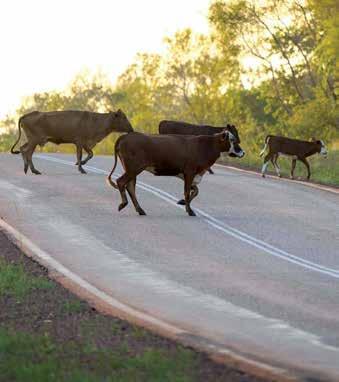
6 minute read
Questions to the WA State Government
Over to you QUESTIONS TO THE WA STATE GOVERNMENT
Thank you to our WA State Government for answering WA Transport Magazine reader’s questions. If you have a question that is related to the transport industry please email it to the publisher at: karen@angrychicken.com.au
Advertisement
QUESTION
I am the HR/HSEQ Manager for MGM Bulk, a transport company that has branches across WA. I am also the Chair of PIRSA (Pilbara Industry Road Safety Alliance). I am sending you this question as the PIRSA Chair.
PIRSA is an alliance formed by industry to improve road safety across the Pilbara Region. One of the items on our agenda is the cattle issue that is currently present on Great Northern Highway (GNH). This has resulted in many incidents for all hauliers (and I imagine the public) who use this road with at least one of which resulted in a fatality. Can we please have some leadership from the Minister and Main Roads regarding animal hazards on roads in WA’s pastoral regions.
In April 2020 the WA Transport Magazine published an article by Main Roads that detailed the Pastoral Animal Hazard Advisory Group convened by them to influence improved outcomes in this area. In the article Brett Belstead, Director of Network Management says, “We are, and will continue working with pastoralists, and other key stakeholders to undertake research and identify opportunities to combat this issue.”
This Advisory Group has not seen any progress in the reduction of this hazard. In fact it came to my attention in a social media post by ABC Kimberley on 2 July 2020, that the group had been put on the backburner due to the COVID-19 pandemic and that the Minister will be seeking further advice before the working group is re-established.
Way back on the 31 May 2011 there was an inaugural meeting of the group ‘Fencing Road Reserve in Pastoral Regions Main Roads/ PGA and Stakeholders’. This is evidential of an issue that has spanned a minimum of 10 years ago continuing to pose a threat to property and lives. In fact, a haulier operating out of Port Hedland experienced the loss of life to one of its operators due to a cow strike incident last year, and still nothing has changed and no progress has been made.
Main Roads representatives provide information at our alliance meetings and have advised they are continuing to negotiate with Pastoralists regarding fencing. However they are making little progress and there is still a lot of unfenced area along Great Northern Highway and cattle are still a major hazard on the roads. This needs to be addressed before we lose more lives.
I have reached out to the Cattleman’s Association, however they were not able to attend one of our meetings to enable us to work together on a solution to this matter. This situation seriously needs some attention. Can you please tell me what Main Roads are actively doing to address this.
~ Niomi Higgs, Chair – Pilbara Industry Road Safety Alliance
Give animals a ‘brake’
SLOW DOWN AT DUSK AND DAWN
You might know the road like the back of your hand, but you don’t know when an animal might suddenly appear in front of your car. Remember to give animals a ‘brake’ and slow down at dusk and dawn. Livestock collisions can be fatal for drivers, passengers and animals. To find out more, or to report a hazard, visit mainroads.wa.gov.au or call 138 138
LIVESTOCK COLLISIONS CAN BE FATAL
Response from Main Road’s Spokesperson
Main Roads’ Animal Hazard Mitigation Program was established in 2013 to target sections of the state road network with a high animal collision risk.
The program developed a number of strategies to improve driver safety and awareness including installing grids on road reserve fence-lines, moving watering points further back from the road-side, installing one way cattle gates, improving Livestock Warning Signage and fencing standards along road reserves and assisting funding new and replacement fencing where it’s deemed a "hot spot".
To continue this important work and reduce the number of animal strike crashes, Main Roads joined forces with members from a number of agencies (Department of Primary Industries and Regional Development; Department of Biodiversity, Conservation and Attractions; RAC; Road Safety Commission; Pastoral Lands Board; Pastoralists and Graziers Association; Western Australian Local Government Association and WA Police Force) in 2018 to
form the Pastoral Animal Hazard Advisory Group (PAHAG).
The PAHAG have met six times since its formation to analyse and review the impacts of pastoral fencing, discuss animal hazard mitigation measures in pastoral areas, explore supplementary and alternative approaches to animal hazard mitigation, report on achievements and provide a forum for discussion between key stakeholders.
Key achievements of the group to date include:
Undertaking significant analysis of crash and animal strike data to identify hotspots within pastoral regions and quantify the effects fencing has had on the level of crashes and animal strikes; and
The development of an education campaign surrounding stray livestock on roads in the Kimberley, Pilbara, Mid-West and Goldfields Esperance regions.
While the Group and education campaign was postponed in line with advice from the Health Department, due to the COVID-19 pandemic, work has been continuing behind the scenes.
The report, which was provided to the Minister for Transport in March 2020, indicated that the overall number of crashes involving pastoral animals reduced by 23 percent (comparison data 20062010 and 2014-2018), and the severity of the crashes that did occur was less.
A targeted education campaign entitled ‘Give Animals a Brake’ was launched in November 2020 across the Kimberley, Pilbara, Mid-West Gascoyne and Goldfields Esperance regions, designed to inform road users - including local residents, visitors, tourists and mine site workers, of the associated risks of animal crashes.
Main Roads has also continued to contact pastoralists in known hot spots during this time, to provide them with information and advise of them of State assistance available with regards to fencing solutions. This has resulted in a number of new fencing agreements at known hotspots with the actual fencing installation ongoing.
More than $8 million has been spent in mitigation works since 2014 and has led to a 23% reduction in crashes involving pastoral animals (comparison data 2006-2010 and 2014-2018). Funds are available to continue the program into the future with an expectation of additional fencing and other mitigations measures at known hotspots that should continue the downward trend in crash numbers.
WA OWNED AND RUN

WA’s premier brake and clutch specialists proudly servicing the states industrial clutch and brake applications.
From major truck workshops, heavy haulage, cranes, the mining industry and more… our team of knowledgeable and qualified technicians share over 100 years combined experience and focus on delivering prompt service alongside the supply of top name brakes and clutches - throughout Australia and Asia. With over 20 years in the industry we have a well-earned reputation for the development, manufacture and supply of quality standard and customised designs to suit a wide range of applications. For the best advice and friendly service contact us today. +61 8 9353 4411 ■ sales@knightbrakeandclutch.com.au
knightbrakeandclutch.com.au


QUICK DRIVE THRU FULLY AUTOMATED TRUCK WASH
24 HR / 7 DAY ACCESS
3 MINUTE EXPRESS WASH
• Road train friendly • Full chassi rinse standard • Credit card facility • Fleet accounts available
www.twepicton.com.au
Roadtrain / truck & dog $140 inc gst
Semi $110 inc gst 6 Wheel Trucks / Bus $88 inc gst
2 Nicholson Road, East Picton T: Darren 0417 909 128 | E: info@twepicton.com.au










